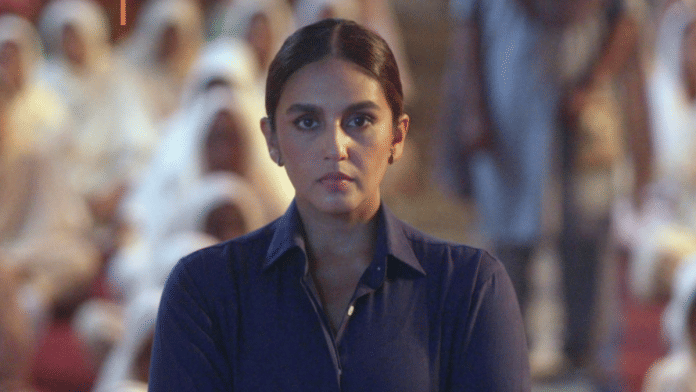New Delhi: Actor Huma Qureshi’s turn as Rani Bharti in ‘Maharani’ – an unlettered housewife who unexpectedly becomes Bihar’s chief minister – got a review from a bureaucrat when it first premiered in 2021. An IAS officer messaged the actor on social media with a mix of praise and protest.
“You acted really well but I did not like one thing. There is a fantastical element in the show – a loyal Bihari woman would never send her husband to jail,” he told the actor in a DM.
Qureshi’s titular character Bharti, on the show, sends her husband to jail over a scam at the end of Season 1.
This was contrary to what once played out in Bihar when Lalu Prasad Yadav had made his wife Rabri Devi the chief minister after he was forced to resign in 1997 and eventually jailed over the fodder scam. But the political drama, now in its fourth season, has since moved to ‘what ifs’ in Bihar’s political landscape.
“Nobody believed in the show. When Season 1 dropped, people did not like the show. We were depressed when we read the reviews, but then it picked up and from journalists to the power corridors of the country, everyone now watches it,” Qureshi, 39, said. The actor also won the Filmfare OTT Award for Best Actress (Critics) in a Drama Series (2021) for the show.
Also Read: Darkest, most disgusting role of my career: Huma Qureshi on playing villain in ‘Delhi Crime’ S3
Power of the Underdog
Inspired by real-life politicians from Bihar – from Rabri Devi, Lalu Yadav to current CM Nitish Kumar – and issues like scams, corruption and caste-based politics plaguing the state, ‘Maharani’ is the longest running political show on OTT, headlined by a woman.
The first two seasons of ‘Maharani’ saw Bheema (Qureshi’s onscreen husband, played by Sohum Shah) try and curb her political juggernaut while the third season had Navin Kumar (Amit Sial) play her opponent.
“People in the power corridors of Delhi like the show, no matter which side they are on, and that’s the power of writing. Rani Bharti is the true representation of everyone’s political fantasy,” Qureshi said.
What’s next for Qureshi?
Qureshi has two upcoming releases, starting with the fourth season of Sony LIV’s ‘Maharani’, and the third season of ‘Delhi Crime’ on Netflix, where she plays the antagonist Badi Didi.
Qureshi describes her role in ‘Delhi Crime’ as “one of the most horrible people” she has played onscreen.
“Monica of ‘Monica O My Darling’ was toxic, but this one is a bad, bad character. But as an actor you just have fun playing bad characters because you can let go, and do anything,” Qureshi said.
Tilottama Shome played the antagonist in the second season of the show, who murders geriatric couples Delhi to finance her dream of opening a salon.
Qureshi is also part of Kannada actor Yash’s anticipated film ‘Toxic’, directed by Geethu Mohandas.
“Let’s call it the Huma Qureshi film festival,” the actor said with a smile.
Beyond Acting
Qureshi’s next venture is her own production company, ‘Saleem Siblings’, that she launched with her brother and actor Saqib Saleem.
The company recently produced the film ‘Single Salma’, with Qureshi in the lead along with actors Shreyas Talpade and Sunny Singh. The film explores the journey of a single, Muslim woman in her 30s in Lucknow, trying to navigate her ambitions and the familial pressure to marry.
“I think launching my production house came from a lot of frustration that you want to tell your kind of stories and make films that mainstream is not making,” Qureshi said.
Qureshi, whose father is the owner of the Saleem’s restaurant chain in Delhi, had no film background when she decided to try her luck in acting in Mumbai. Qureshi made her feature film debut with a supporting role in Anurag Kashyap’s ‘Gangs of Wasseypur’ (2012), where she she became a pop culture sensation with the dialogue, ‘Poochhke rakhiye haat, koi mana thodi hai, permission leni chahiye na?” (You can hold my hand, but you should ask for permission, no?).
Since then, she has moved between art-house and mainstream cinema. But ‘Maharani’ gave her the kind of mass appeal few women-led political shows have managed.
But Qureshi is unapologetic about the special appearances in songs like ‘Shikayat’ in ‘Gangubai Kathiawadi’ (2022) or more recently, the item song ‘Dil Thaam Ke’ in ‘Maalik’.
“I am not a sob story person. You’ll never hear me sitting and crying about how the system was unfair and rejected me. The only thing in my control is my choices and hard work, and I will make sure that every single time I am doing a project, it is so different from each other that you will be stunned by the range of work I can do,” Qureshi concluded.
(Edited by Stela Dey)






